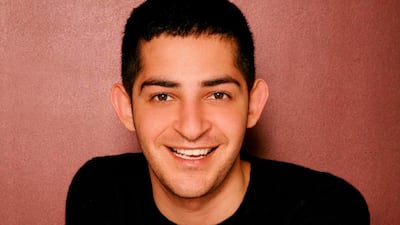Chaker Khazaal, the Palestinian-Canadian author of the Confessions of a War Child trilogy, was barred from entering Palestine by Israel last week.
The Tale of Tala writer had just concluded a trip to Jordan, where he was raising funds for Syrian refugees with the United Nations High Commissioner for Refugees (UNHCR), when he decided to travel to Palestine.
Khazaal, who was born as a refugee in Lebanon, was heading to Jerusalem via the Allenby Bridge on Tuesday, February 18, when Israeli officers stopped him at the border.
"They asked me about my work and asked me to login to Facebook and Instagram to review my posts," Khazaal tells The National. He was questioned about specific posts he had made in relation to the 'Deal of the Century,' a controversial plan by Donald Trump to resolve the Israeli-Palestinian conflict.
“My post only encouraged proper negotiations,” Khazaal says. “They also asked me about a post I had made in relation to the Palestinian refugees in Lebanon, in which I had suggested a few solutions.”
After keeping Khazaal waiting for five hours, Israeli officers returned to tell the novelist that he had been denied entry to his homeland. He was denied entry as per Israel’s 5712-1952 law, which cites reasons of “public security or public safety or public order considerations."
“It shook me to the core,” Khazaal says. “This denial of entry to my homeland, the same that I experienced as a child haunts me again now, just like it haunted my grandfather 72 years ago.”
Khazaal, who is currently in Lebanon, first visited Palestine in 2015 to look for his grandfather’s village, Tarshiha. “I went to plant an olive tree for him as per his last request. In Tarshiha I made friends everywhere, and reconnected with my roots – a feeling that everyone born a refugee strives for.”
Khazaal has returned to Palestine several times since then, always using his Canadian passport, which is his only nationality. He says it became his pilgrimage as a writer, adding that his work has never been political but always strove to tell the human story.
"I wrote Tale of Tala from Jerusalem, Jericho and Tarshiha. I did book signings on other trips and spoke at a high school in Ramallah advocating for peace, negotiations, and dialogue. This has been the core of my messages in articles, social posts, activities, books, and advocacy to refugee rights."
In 2018, Khazaal commemorated his grandfather's journey by re-walking the path he took back in 1948 when he became a refugee.
Khazaal was stopped by immigration officers during past visits as well. Each time, he was kept waiting for hours until security personnel interrogated him before issuing a tourist visa.
“This time, [their] questions were focused on my frequent trips to Lebanon and my work as a writer and speaker in the media.”
Khazaal tried explaining the reasons for his visits to Beirut, the city of his birth, to the border officers. He told them he was collaborating with a group of young Lebanese developers, who are developing an interactive app to go along with Life Dice, a novel about the Yazidis in Iraq, which he is publishing later this year.
On this specific visit, Khazaal says he was planning to stay a night at the American Colony in Jerusalem – where he always stays and writes from – before heading north to Tarshiha.
"We were going to celebrate a friend's birthday, Shadi Dakwar, a singer and former Arab Idol contestant," Khazaal says, adding that the denial hit him hard and struck at his belief in humanity.
“Jerusalem, Tarshiha, and every other part of the homeland has been my safe haven, away from politics and the conflict that we, the people, paid the price for, and continue to.”


